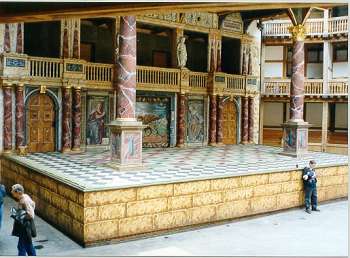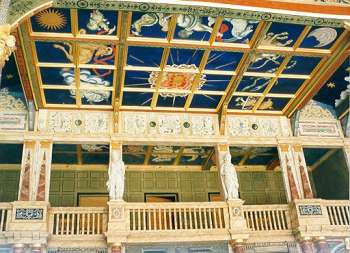| Home |
| Gaynor |
| Mike |
| Art |
| Theatre |
| Book Shop |
New Globe Playhouse1998 Season |
|||||||||||||||||||||||||||||||||||||||||||||||||||
|
|
|||||||||||||||||||||||||||||||||||||||||||||||||||
Introduction |
|||||||||||||||||||||||||||||||||||||||||||||||||||
| In the summer of 1998 I returned to the Globe, and enjoyed the experience even more than on last
year's visits. The plays on offer were
The Merchant of Venice and As You Like It.
Later in the season I returned to see a visiting Cuban production called
Otra Tempestad The foyer area is now finished, and a permanent bookshop has been opened selling a very good range of books and artefacts associated with the Globe, Shakespeare and his plays. |
|||||||||||||||||||||||||||||||||||||||||||||||||||
Merchant of Venice |
|||||||||||||||||||||||||||||||||||||||||||||||||||
| On 29th May, I attended the first Shakespeare play in this year's season, The Merchant of Venice. I was
seated on the front row of the ground floor gallery. Twenty minutes before the 2pm start, a bell tolled from above
the stage and masked actors started to mingle with the audience in the yard. They joked with them and with each
other. One of them started to sing an Italian comic song (I think it was comic; my Italian is virtually non-existent).
He came over to our gallery and spent some time trying to teach us to sing the last word of each line - padre,
madre, sorella. Even I know father, mother, sister, but who knows what I may have been accusing my family of! However
many of us did join in, and were encouraged to carry on singing as the character climbed on stage and tried to
disrupt the religious singing of a group of characters dressed in black entered centre stage. Our singing teacher
was the clown Launcelot Gobbo played by the Italian actor Marcello Magni. He is an accomplished clown, and is exactly
the sort of performer who drew the crowds to the Globe in Shakespeare's day,
Kemp and Armin. I loved him as
did the rest of the audience, but I'm still trying to trace the source of the line about bacon sandwiches in Act
3 Scene 5! The play itself directed by Richard Olivier was hugely enjoyable. Mark Rylance as Bassanio is as always interesting and human, while Kathryn Pogson's Portia is a statuesque beauty of intelligence and humour. Jack Shepherd's Antonio was more angry and grouchy than melancholy, and seemed rather young to need men to support him across the stage. I found the diction of some of the supporting players often made hearing the words difficult. This was also true of Norbert Kentrup's Shylock, but nevertheless it was a performance of power and authority. This play is one of Shakespeare's most accessible. It has a terrific story and it gives me a thrill to hear the gasp from a young audience when Bassanio chooses the right casket. But it is also the most difficult for Post-Holocaust audiences to feel comfortable with. The play was written for an audience who had no doubt that a Jew was evil and would be damned. Even Shakespeare's humanisation of Shylock cannot mollify that all pervading mood more than a little. I have seen several productions which have succeeded in varying degrees to shift the sympathy towards Shylock. I think that the nature of the audience participation at the Globe causes simple good/evil, hero/villain reactions, and that some of the audience were bound to hiss Shylock. It is uncomfortable, but I don't know how any modern company could handle it successfully. |
|||||||||||||||||||||||||||||||||||||||||||||||||||
|
|
|||||||||||||||||||||||||||||||||||||||||||||||||||
As You Like It |
|||||||||||||||||||||||||||||||||||||||||||||||||||
|---|---|---|---|---|---|---|---|---|---|---|---|---|---|---|---|---|---|---|---|---|---|---|---|---|---|---|---|---|---|---|---|---|---|---|---|---|---|---|---|---|---|---|---|---|---|---|---|---|---|---|---|
| The second play in the 1998 season was As You Like It and I saw Lucy Bailey's production on the afternoon
of June 12th. The weather all week had been cool and wet, but on Friday the sun shone on us. The Globe is most successful when the audience is involved, and this company took this further than any other by using the yard in front of the stage as an extension of the performance space, and regularly employing the doors around the yard as entrances and exits. Planks were ranged across the entire width of the stage front forming steps from the yard to the stage. A programme note admits that "the steps are not a known feature of the Globe but part of an experiment in the use of the space." The wrestling match took place in the yard, the actors mixing with the audience and running amongst them. Two actors planted as members of the crowd were "encouraged" to carry the defeated Charles off. It was an exciting start. The Globe seems to make the role of Clown more important than in any other theatre. He is the link between the audience and the other characters; a member of both communities. David Fielder's Touchstone was almost as successful in this role as Marcello Magni's Gobbo was in The Merchant of Venice. Bawdy and vulgar, with a Northern accent, an old fashioned comic of the Les Dawson school, he was a joy. John McEnery was born to play his antithesis Jaques, while many of the minor comic parts, Sir Oliver Martext, Corin, Le Beau were all played with aplomb by veteran comic actor Jonathan Cecil, previously known for upper class "silly ass" parts. The success of As You Like It though must depend on Rosalind, and Anastasia Hille certainly did not fail. She was feisty, feminine and funny. "Tiring company after a hard day in the forest" according to critic Michael Billington in The Guardian, but I disagree; I was always pleased to be in her company. Both Shakespeare productions in the season gave me immense pleasure, and by the reaction of the rest of the audiences, I was not alone in that feeling. Michael Billington has asked whether the Globe is an effective setting for the great serious works. I really would like to see Hamlet on this stage. |
|||||||||||||||||||||||||||||||||||||||||||||||||||
Otra Tempestad (Another Tempest) |
|||||||||||||||||||||||||||||||||||||||||||||||||||
|
For less than a week in July the Teatro Buendia from Cuba presented a very freely adapted version of Shakespeare's The Tempest called Otra Tempestad or Another Tempest at the Globe. I went along for the Friday afternoon performance and became a groundling for the first time; that is I paid five pounds and stood in the yard. The performance only lasted ninety-five minutes, but even then it flew by. You could say that my grasp of the Spanish language is limited. Let's be honest, I couldn't construct the simplest sentence! The play was directed by Flora Lauten, and written by her and Raquel Carrio, and without the scene-by-scene description in the free program I would not have had the first idea what was happening. Briefly, and simplifying somewhat, Prospero, Miranda, Hamlet, Othello, Shylock and Macbeth arrive on the island, and become involved with the children of Sycorax, queen of the island. Her children are Caliban, Oshun, Oya and Eleggua who are Orishas or Afro-Cuban deities. Prospero mistakes Eleggua for Ariel and transforms him/her into Ariel by his magic. The program refers to Eleggua as "he", but "his" costume later in the play leaves no doubt as to Ariel's gender, and the young actress Giselle Navaroli is both beautiful and athletic. Prospero declares that he wants to turn the island into Utopia, but is persuaded to marry Miranda to Othello to ensure military stability. He is overthrown by the cruel Macbeth who feasts on the body of Miranda, but the warriors destroy each other, and leave the island to its original king Caliban. And what about Hamlet you ask? Well he survived by being the clown! Oh yes, and Shylock reveals that in his youth he was Romeo. I'm not making fun of the play. It is a mixture of Shakespeare with cultures of which I know nothing, and in a foreign tongue. It is also impossible to miss the parallels with the history of Cuba. But did I enjoy it? I certainly did, and that is the important thing. The spectacle, the mime, the music, the experience was exciting throughout. The Globe was the place to stage this bold, physical piece, and standing five feet from the stage I felt right in the heart of the action. |
|||||||||||||||||||||||||||||||||||||||||||||||||||
Links |
|||||||||||||||||||||||||||||||||||||||||||||||||||
Internal |
|||||||||||||||||||||||||||||||||||||||||||||||||||
|
|||||||||||||||||||||||||||||||||||||||||||||||||||
Home|Gaynor|Mike|Art|Theatre|Book Shop |
|||||||||||||||||||||||||||||||||||||||||||||||||||
|
Updated 2nd January 2001 |
|||||||||||||||||||||||||||||||||||||||||||||||||||




